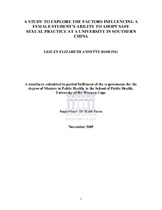| dc.contributor.advisor | Stern, Ruth | |
| dc.contributor.author | Rosling, Lesley Elizabeth Annette | |
| dc.contributor.other | School of Public Health | |
| dc.contributor.other | Faculty of Community and Health Sciences | |
| dc.date.accessioned | 2013-05-24T09:57:19Z | |
| dc.date.available | 2007/03/15 13:42 | |
| dc.date.available | 2007/03/30 | |
| dc.date.available | 2013-05-24T09:57:19Z | |
| dc.date.issued | 2005 | |
| dc.identifier.uri | http://hdl.handle.net/11394/215 | |
| dc.description | Master of Public Health - MPH | en_US |
| dc.description.abstract | There are estimated to be 840,000 people living with HIV in China (1) of whom 65% are estimated to be in the 16-29 year age group. Since the end of the Cultural Revolution and the opening of China to Western influence, traditional cultural norms have rapidly eroded and China is described as being in the middle of a sexual revolution (2). People are increasingly engaging in behaviours exposing them to the risk of contracting HIV which is spreading from the traditionally high risk populations to the general population via the heterosexual route (3). Comprehensive prevention strategies are necessary to prevent further spread (4). There is evidence that the observed increase in sexual activity is not accompanied by adequate knowledge of HIV transmission. 79% of 18-25 year olds know that HIV/AIDS can be transmitted by sexual intercourse, but a mere 30% know that correct and consistent condom use can protect against HIV transmission (5). This exploratory study investigated the factors that influence safe sexual practices amongst female Chinese university students, enabling or preventing them from taking responsibility for their reproductive health. The literature search revealed this to be a largely unexplored area. The study was undertaken amongst third year male and female students, recruited from the Department of Comparative Literature and Media Studies at the Zhongshan University in Guangzhou, China. Data was predominantly collected using two male and two female focus group discussions. Three key informant interviews supported and contextualised the findings. The study revealed that the factors influencing female students’ ability to adopt safe sexual practices are complex. The recognised shortcomings of sex education in China (6) are compounded by the taboo of sex and the pressure placed on students for the achievement of good grades. The university environment exerts a powerful influence. The ease with which mutually beneficial same sex friendships develop in the dormitory can be contrasted with the difficulties faced by couples attempting to conduct relationships. The restrictive university environment has the effect of driving relationships underground. Gender roles are deeply entrenched. The need to conform to the ideal pure, naïve, and non-inquiring female stereotype affects a female student’s ability to source sexual health information, negotiate safe sex, and to adopt safe sexual practices. Two distinct male stereotypes emerged: the traditional more gender equal male, and the liberal male who believes in an earlier age of sexual initiation and condones multiple sexual partners. All students are aware of HIV but have misconceptions about the specifics of HIV transmission, believing that HIV can be transmitted by kissing, from unclean baths and from doctors. Some students were of the belief that poor personal hygiene is an indicator of possible HIV positive status. Students were confused by condom quality issues. As they had received no formal condom training students relied on reading the package instructions or working it out for themselves.This small exploratory study resulted in the production of rich and surprising findings. These are incorporated into recommendations for future research and a comprehensive sex education programme at the university. Abstinence and mutual monogamy should be emphasised. Gender stereotypes that influence behaviour and choice of sex education materials should be acknowledged. Negotiation skills training should be incorporated together with condom and contraceptive advice. A sexual health page on the student website and a training programme for students to become peer-to-peer sex educators should be introduced. | en_US |
| dc.language.iso | en | en_US |
| dc.publisher | University of the Western Cape | en_US |
| dc.subject | College students | en_US |
| dc.subject | Sexual behavior | en_US |
| dc.subject | China | en_US |
| dc.subject | Health and hygiene | en_US |
| dc.subject | AIDS (Disease) | en_US |
| dc.subject | Prevention | en_US |
| dc.title | A study to explore the factors influencing a female students ability to adopt safe sexual practice at a university in Southern China | en_US |
| dc.type | Thesis | en_US |
| dc.rights.holder | University of the Western Cape | en_US |
| dc.description.country | South Africa | |

